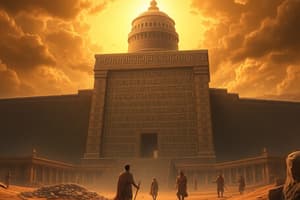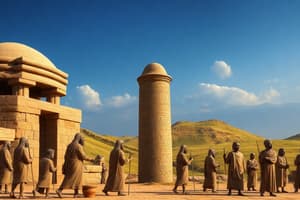Podcast
Questions and Answers
Sapa sing dikenal minangka raja kang ndirikan kode hukum kang diarani Kode Hammurabi?
Sapa sing dikenal minangka raja kang ndirikan kode hukum kang diarani Kode Hammurabi?
- Sargon I
- Hammurabi (correct)
- Nebuchadnezzar II
- Cyrus the Great
Ziggurat iku struktur kang digunakake mung kanggo tujuan komersial.
Ziggurat iku struktur kang digunakake mung kanggo tujuan komersial.
False (B)
Apa jeneng sistem tulisan Sumerian?
Apa jeneng sistem tulisan Sumerian?
Cuneiform
Sistem agama kang percaya marang akeh dewa disebut __________.
Sistem agama kang percaya marang akeh dewa disebut __________.
Pasangake raja karo jaman utawa prestise sing ditandai:
Pasangake raja karo jaman utawa prestise sing ditandai:
Flashcards
Cuneiform
Cuneiform
Sistem tulis Sumeria kang digunakake kanggo ngrekam basa lan gambar. Nggunakake simbol-simbol berbentuk baji kanggo menehi makna.
Ziggurat
Ziggurat
Situs suci sing dibangun para wong Mesir Kuno ing bentuk piramida. Biasane didegake kanggo ngurmati para dewa lan dewi.
Code of Hammurabi
Code of Hammurabi
Siji-sijiné bab utama ing budaya Sumeria sing nyoba ngatur kabeh aspek gesang manusia, saka hukum lan bisnis nganti ritual lan etika. Sistem iki nyediani hukum kanggo kabeh wong, saka raja nganti rakyat biasa.
Hammurabi
Hammurabi
Signup and view all the flashcards
Cyrus Agung
Cyrus Agung
Signup and view all the flashcards
Study Notes
Kabihasnan sa Daigdig - Mesopotamia
- Mesopotamia, meaning "land between the rivers," is the region between the Tigris and Euphrates Rivers.
- The area is rich in fertile soil, ideal for agriculture, which led to the development of early civilizations.
- The Sumerians are considered one of the earliest civilizations in Mesopotamia.
- Early civilizations also included Akkadians, Babylonians, Assyrians, and Chaldeans.
Mga Katangian ng Kabihasnan
- Kabihasnan refers to advanced stage of human society with complex social structures, organized government, culture, and technology.
- High level of knowledge, technology, culture, and organized governance are indicators of a civilization.
- Development of arts, sciences, language, and economics are also characteristic of a civilization.
Mga Ilog sa Mesopotamia
- Tigris at Euphrates Rivers provided fertile land for agriculture, irrigation, and transportation. These rivers are crucial to the development of the region's civilizations.
- The "pagitan ng mga ilog" (land between the rivers) provided a natural environment for the prosperity of early civilizations.
Mga Sinaunang Lungsod-Estado
- The Sumerians built 12 independent city-states in the region, such as Eridu, Kish, Lagash, Uruk, and Ur.
- Each city-state was governed by a king.
Relihiyon
- Mesopotamia was polytheistic, meaning the people believed in and worshiped multiple gods.
- There were many gods and goddesses that represented natural phenomenon like sun, rain, and earth.
- This is evident in their artistic and architectural creations, particularly the Ziggurats.
Ziggurat
- Ziggurats were massive stepped temple towers.
- These structures served as temples, religious centers, and observatories in ancient Mesopotamia.
- Examples include those in Ur.
Cuneiform
- Cuneiform was the first writing system to be developed in Mesopotamia.
- It's a system of wedge-shaped symbols, pressed onto clay tablets, which had various purposes, including record-keeping.
Mga Ratan sa Kabihasnang Mesopotamia
- Nobile – A type of writing style and system, which is made up of wedge-shape symbols.
- Mga pagsulong sa sining, agham, wika, at ekonomiya - The key indicators of the civilizations development.
- Mga hari - Played an important role in governing and expanding the territory of the city-state.
Haring Ur-Nammu
- Ur-Nammu was a significant ruler of Ur during the Sumerian Renaissance.
- He oversaw the construction of several notable Ziggurats.
- The reign of Ur-Nammu shows the importance and impact of leadership in shaping the region.
Haring Hammurabi
- Hammurabi was a king of Babylon.
- His most famous achievement was the Code of Hammurabi, a set of laws that codified Babylonian social and legal structures.
- This code, known for the principle of "eye for an eye," served as a basis for future legal systems.
Iba pang mga Mahalagang Kabihasnan
- Hittites– A civilization to the north, prominent in the region's history.
- Chaldean- another civilization in the area, which rose to power in Mesopotamia.
Mahalagang Tauhan
- Nabopolassar– He established the Neo-Babylonian Empire.
- Nebuchadnezzar II– He was a ruler who fostered the Golden Age of Mesopotamia and the construction of several monumental structures.
- Cyrus the Great– He was important in the fall of the Chaldean Empire and the growth of the Persian Empire.
- Sargon I– He created the first empire in Mesopotamia and influenced the development of future empires in the area.
- Darius the Great– Expanded the Persian Empire and contributed to its governance.
Iba pang impormasyon
- Akkadian Empire – First empire in Mesopotamia created by Sargon I.
- Persian Empire – A great empire that eventually encompassed much of the ancient Mesopotamian region.
Studying That Suits You
Use AI to generate personalized quizzes and flashcards to suit your learning preferences.




